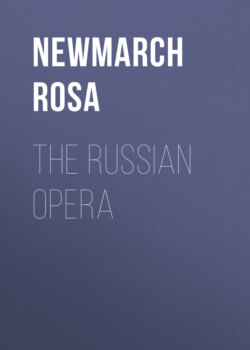The Russian Opera

Реклама. ООО «ЛитРес», ИНН: 7719571260.
Оглавление
Newmarch Rosa. The Russian Opera
The Russian Opera
Table of Contents
PREFACE
THE RUSSIAN OPERA
CHAPTER I. THE DAWN OF MUSIC IN RUSSIA
CHAPTER II. RUSSIAN OPERA PRIOR TO GLINKA
CHAPTER III. MICHAEL IVANOVICH GLINKA
CHAPTER IV. GLINKA’S OPERAS
CHAPTER V. DARGOMIJSKY
CHAPTER VI. WORK AND INFLUENCE OF SEROV
CHAPTER VII. ANTON RUBINSTEIN
CHAPTER VIII. BALAKIREV AND HIS DISCIPLES
CHAPTER IX. GRADUAL DISSOLUTION OF THE CIRCLE OF FRIENDS
CHAPTER X. MOUSSORGSKY
CHAPTER XI. BORODIN AND CUI
CHAPTER XII. RIMSKY-KORSAKOV
CHAPTER XIII. TCHAIKOVSKY
CHAPTER XIV. CONCLUSION
INDEX OF OPERAS
INDEX OF NAMES
Отрывок из книги
Rosa Newmarch
Published by Good Press, 2019
.....
Russian opera made a decided step in advance when in 1751 Araja composed music to a purely Russian text. The subject, La Clemenza di Tito, which Mozart subsequently treated in 1791, had nothing in common with the national life, but the libretto was the work of F. G. Volkov, and the effect was quite homogeneous, for all the singers sang in the vernacular instead of some using the Russian and some the Italian language as was formerly done. This tasteless custom did not wholly die out until well into the nineteenth century, but it became less and less general. Thus in 1755 we hear of Araja’s Cephalus and Procius being confided entirely to singers of Russian birth. The book of this opera was by Soumarakov, based on materials borrowed from the “Metamorphoses” of Ovid. The work is said to have been published in 1764, and is claimed by some to be the earliest piece of music printed in Russia. J. B. Jurgenson, head of the famous firm of music publishers in Moscow, who has diligently collected the Russian musical publications of the eighteenth century, states that he has never found any of Araja’s operas printed with music type. The fact that music was printed in Russia before the reign of Catherine II. still needs verification. The scenery of Cephalus was painted by Valeriani, who bore one of the high sounding titles which it was customary to bestow at the Court of Russia—being distinguished as “First Historical Painter, Professor of Perspective (scene painting) and Theatrical Engineer at the Imperial Court of Russia.” Among the singers who took part in the performance were Elizabeth Bielogradsky, daughter of a famous lute player, Count Razoumovsky, and Gravrilo Martsenkovich, known as Gravriloushko. The success of the opera was brilliant, and the Empress presented the composer with a fine sable coat as a mark of her gratification. In 1755, Araja, having amassed considerable wealth, returned to Italy and spent the remaining years of his life at Bologna.
Music under the Empress Elizabeth became a fashionable craze. Every great landowner started his private band or choir. About this time, the influence of the Empress’s favourite, Razoumovsky, made itself felt in favour of Russian melodies. By this time, too, a few talented native musicians had been trained either in the Court Chapel or in some of the private orchestras established by the aristocracy; but the influx of foreigners into Russia threatened to swamp the frail craft of native talent which had just been launched with pride upon the social sea. The majority of these foreigners were mediocrities who found it easier to impose upon the unsophisticated Russians than to make a living in their own country; but the names of Sarti, Paisiello, and Cimarosa stand out as glorious exceptions among this crowd of third and fourth rate composers.
.....